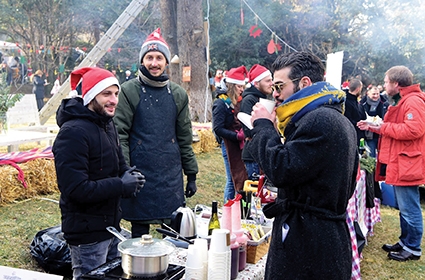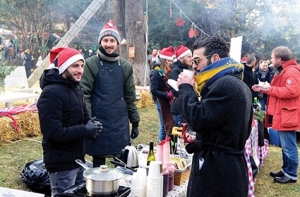Singing Praises to Bulbuli Market
Life is a breeze if you’re a European farmer. Well, maybe not exactly a breeze, but you can at least sustain yourself and your business and get enough opportunities to show off your product, which is key to success and further expansion.
What we’re getting at are festivals – the all-important venue where you put out that delicious cheese made according to grandma’s recipe, or that wine you’ve been trying to develop a bouquet for over the last two years, to see how people like it, and to see how others from your field have been doing. In Europe those opportunities come aplenty – in Georgia not so much. It is a shame, really, considering that Bazaar traditions in Tbilisi and Georgia in general count centuries. Sure, we have occasional cheese and wine festivals from time to time, but those are not as frequent as one would like and in most cases are too specialized for first-time guests and viewers. One emergent festival plans to change things for the better, though: the Bulbuli (Nightingale) Market, organized by Georgia’s Wine Tourism Association, was a resounding success when held for the first time in November, and then during its comeback on Christmas Eve.
This time held at the Muza cultural center, it saw 75 companies from different regions of Georgia taking part, including winemakers, farmers, cooks and artists. The festival was held in the form of a Christmas Fair, where traditional Georgian and European cuisine was presented, as well as wines, teas, sweets, dairy products and handmade products. The public could taste and purchase the presented items, as well as take part in various activities such as a raffle, dances and children’s activities.
One of the organizers, Elene Bukhaidze, says the aim of the event was to connect different people from various companies, as well as to open new perspectives for them.
“We try to help them get popular and increase their sales. There are cafes and restaurants presented, as well as producers of bio-products like cheese and honey. The producers keep the money earned from sales at the event. We plan to organize more events like this next spring and autumn,” Bukhaidze said.
Among visitors was game designer extraordinaire and visual reality expert Mark Rein-Hagen, who has been living in Georgia for the last nine years. Surrounded with children, Rein-Hagen loudly confessed his love for Georgia and also reminisced on how much Georgia has developed during the years he has spent living here. “When I first came, even buying a hamburger was a potential problem,” he announced, lauding the festival’s wide choice of fusion dishes. “Events like these are best for attracting tourists and it’s good these people, small and medium scale enterprisers, are given a chance to show off their products”.
One stall stood out from the rest- a “delegation” from one of Georgia’s most beautiful places, the mountainous Tusheti. The ‘Tusheti 2015’ cooperative presented endemic Tushetian honey, Guda cheese, other dairy products, tea, potatoes, traditional spirits and other handmade items. The cooperative was created in 2015 with the assistance of the Czech non-governmental organization ‘Caritas Czech Republic in Georgia’. Marina Guzarauli, representative of the company, says this kind of festival is of vital importance to Tushetian enterprisers.
“Our production is made in Tusheti and is biologically cleaner than most the imported competition. This is our advantage.
Right now our cooperative consists of six persons and our family members are also involved. We have greenhouses where potatoes and vegetables are cultivated and we were the first to cultivate cucumbers in Tusheti and sell them to the local hotels,” Guzarauli said.
She added that raising awareness is key to the cooperative’s activities. People must understand the importance of consuming healthy products.
“We want to increase the number of customers and this festival is the best opportunity, though it would be nice to see such festivals occurring on a systematic basis and for us to have more options in terms of delivering our products. It also helps prevent Tushetian people from leaving the region – if there is profit to be made, they’ll stay and continue producing their goods,” Guzarauli pointed out.
Vazha Tavberidze & Tatia Akhvlediani











